Sleep, Chronobiology, and Health Laboratory
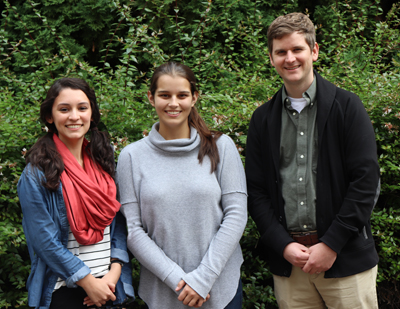
Research interests
Our laboratory focuses on understanding why insufficient sleep and being awake during the night leads to poorer health and impaired cognitive performance. In particular, we study how eating when our body is promoting sleep influences energy expenditure, glucose metabolism, cardiovascular health, and overall body composition.
Recent findings
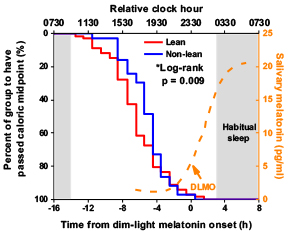
Non-lean individuals eat a higher percentage of their calories closer to the timing of their melatonin onset.
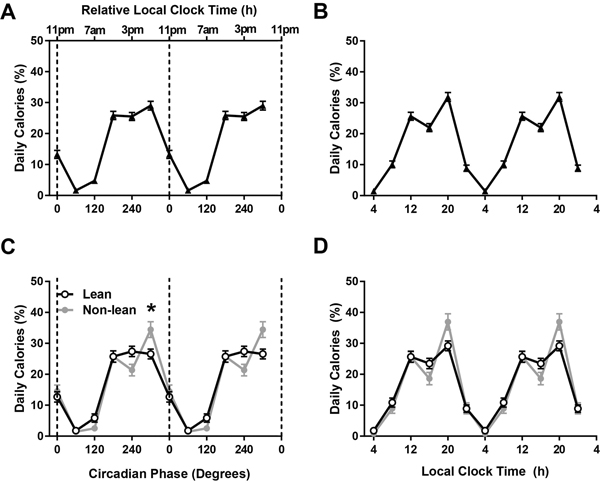
Influence of circadian and local clock timing on percentage of daily calories in all participants (A, B) and between lean and non-lean participants (C, D). All participants (n = 106) are denoted as triangles, the lean group (n = 68) is denoted by open circles and the non-lean group (n = 38) by closed gray circles. Data are double plotted across circadian phase (0 significant difference after Bonferroni correction (p = 0.007) between lean and non-lean groups. Error bars represent standard error of the mean. From McHill et al., Nutrients 2019
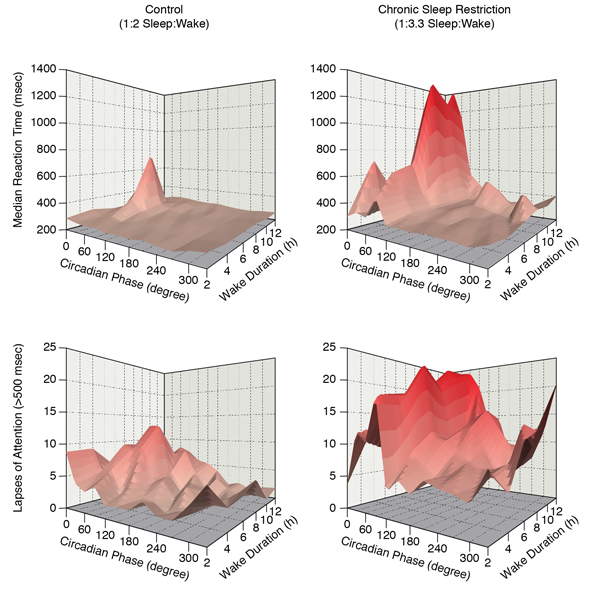
Higher median reaction time (RT) and number of lapses indicate worse PVT performance. PVT median RT (top row), lapses of attention (bottom row), Control condition (n = 8, left column) and CSR condition (n = 9, right column). From McHill et al., PNAS 2018
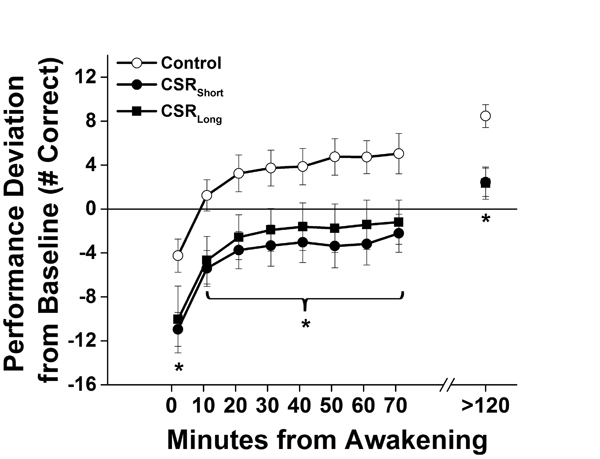
Number of correct responses on the Digit Symbol Substitution Task (DSST) under Control conditions (equivalent of 8 h scheduled sleep per 24 h, open symbols) and under both chronic sleep restriction (CSR) conditions (equivalent of 5.6 h scheduled sleep per 24 h, closed symbols) are plotted as average ( St. Err; error bars) deviation from Baseline for each individual (solid horizontal line) on y-axis and by minutes since awakening from sleep on x-axis. Data plotted below average Baseline performance levels indicate performance impairment. Asterisks indicate a significant difference using mixed model techniques and t-tests (p<0.05) between the combined CSR conditions and Controls. Data are from n=26 participants. From McHill et al., Sleep 2
Lab members

Andrew McHill, PhD
Dr. McHill graduated with a Ph.D. in Integrative Physiology with a specialization in sleep and circadian physiology from the University of Colorado Boulder. After graduating, he completed an NIH funded post-doctoral fellowship at the Brigham and Women's Hospital and Harvard Medical School within the Division of Sleep and Circadian Disorders and joined the Oregon Institute of Occupational Health Sciences in Dr. Shea's Circadian Laboratory in 2016 as a visiting post-doctoral fellow. In July 2017, he became a full time postdoctoral fellow within the institute. Dr. McHill is interested in understanding the contributing mechanisms by which circadian misalignment (i.e. shiftwork or jetlag) and insufficient sleep leads to adverse metabolic health and poor cognitive performance outcomes. Link to his faculty page.
Publications
- McHill A.W., Hull J.T., McMullan C.J., Klerman E.B. “Chronic Insufficient Sleep has a Limited Impact on Circadian Rhythmicity of Subjective Hunger and Awakening Fasted Metabolic Hormones”. Frontiers in Endocrinology, 2018, 9:319. PMID: 29946297
- McHill A.W., Hull J.T., Wang W., Czeisler C.A., Klerman E.B. “Chronic Sleep Curtailment, Even Without Extended (>16 h) Wakefulness, Degrades Human Vigilance Performance”. Proceedings of the National Academy of Sciences of the United States of America, 2018 115(23): 6070-6075. PMID: 29784810
- Depner C.M., Melanson E.L., McHill A.W., Wright Jr., K.P. "Mistimed food intake and sleep alters 24 hour time-of-day patterns of the human plasma proteome". Proceedings of the National Academy of Sciences of the United States of America, 2018, 115(23):E5390-E5399. PMID: 29784788
- McHill A.W., Czeisler C.A., Shea S.A. "Resident physician extended work hours and burnout". Sleep, 2018 41(8). PMID: 29901751
- McHill A.W., Phillips A.J.K, Czeisler C.A., Keating L., Yee K., Barger L.K., Garaulet M., Scheer A.J.L., Klerman E.B. “Later circadian timing of food intake is associated with increased body fat”. American Journal of Clinical Nutrition, 2017 106(5): 1213-1219. PMID: 28877894
- Stothard E.R.*, McHill A.W.*, Depner C.M., Birks B.R., Moehlman T.M., Ritchie H.K., Guzzetti J.R., Chinoy E.D., LeBourgeois M.K., Axelsson J., Wright Jr., K.P. “Circadian Entrainment to the Natural Light-Dark Cycle Across Seasons and the Weekend” Current Biology, 2017, 27(4); 508-13. *These authors contributed equally. PMID: 28162893
- McHill A.W., Wright Jr. K.P. “Role of sleep and circadian disruption on energy expenditure and in metabolic predisposition to human obesity and metabolic disease” Obesity Reviews, 2017 Suppl 1:15-24. PMID: 28164449
- Burke T.M., Markwald R.R., McHill A.W., Chinoy E.D., Snider J.A., Bessman S.C., Jung C.M., O’Neill J.S., Wright Jr. K.P. “Effects of caffeine on the human circadian clock in vivo and in vitro.” Science Translational Medicine, 2015 (7) 305:305ra146. PMID: 26378246
- McHill A.W., Melanson E.L., Higgins J., Connick E., Moehlman T.M., Stothard E.R., Wright Jr., K.P. “Impact of Circadian Misalignment on Energy Metabolism During Simulated Nightshift Work.” Proceedings of the National Academy of Sciences of the United States of America, 2014 111:17302-17307. PMID: 25404342
- Wright Jr. K.P., McHill A.W., Birks B.R., Griffin B.R., Rusterholz T., Chinoy E.D. “Entrainment of the Human Circadian Clock to the Natural Light-Dark Cycle.” Current Biology 2013 23:1554–1558. PMID: 23910656
Grant support
Current grant support
K01 HL146992-01 (AW McHill) 04/01/2019-03/31/2023 NIH/NHLBI
Title: Uncovering circadian mechanisms of poor cardiometabolic health
Major goals of this project are to determine the impact of the transition to a bus-driving schedule on weight management behaviors and design intervention to reduce weight and improve health.
Role: Principal Investigator
Oregon Institute of Occupational Health Sciences Innovation Funds (AW McHill / R Olson)
5/01/2018-4/30/2019
Title: Impact of the transition into mass transit bus driving on workers
AWM Role: co-PI/Project Leader
Overall Goal: Obtain preliminary data to determine the impact of the transition to a bus driving schedule on weight management behaviors.
Past grant support
NIH 1KL2TR002370-01 (D Jacoby /AW McHill)08/01/2017-03/31/2019
Title: Influence of circadian misalignment and obstructive sleep apnea on energy balance and glucose metabolism
AWM Role: PI/Project Leader
Overall Goal: Determine the impact of circadian misalignment and obstructive sleep apnea on energy and glucose metabolism and obtain the training necessary to become an independent investigator.
NIH 1F32DK107146-01A1 (AW McHill) 06/30/16-06/29/17
Title: Influence of meal timing and sleep variability on macronutrient intake and body composition in college undergraduates
AWM Role: PI/Project Leader
Overall Goal: Determine the relationship between the timing of food consumption and sleep and circadian measures in college undergraduates
NIH 5T32HL007901-17 (CA Czeisler/ AW McHill) 08/01/98-06/30/18
Title: Training in sleep, circadian, and respiratory neurobiology
AWM Role: Post-doctoral Trainee/Project Leader
Overall Goal: Develop and train young sleep and circadian research scientists